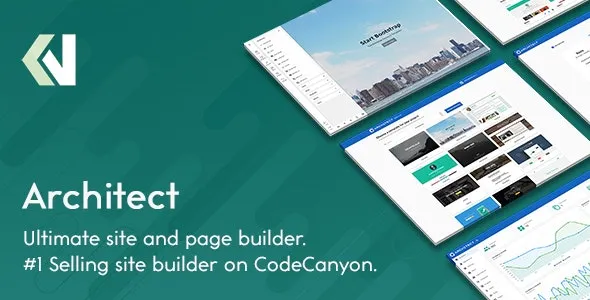Architect HTML and Site Builder Nulled is a comprehensive HTML and site builder designed to simplify the web development process for developers, designers, and businesses. With its powerful features, user-friendly interface, and extensive customization options, Architect aims to provide a seamless solution for creating stunning websites and web applications. In this blog post, we will explore the features and capabilities of Architect, discuss who it is ideal for, weigh its pros and cons, and compare it with other popular site builders.
In the ever-evolving digital landscape, having a robust and flexible web development tool is crucial for creating professional and high-performing websites. Architect offers a range of tools and features that make it easier for users to build and customize their web projects. Whether you are a seasoned developer or a business owner with no coding knowledge, Architect HTML and Site Builder Free Download provides the resources needed to create visually appealing and functional websites. By leveraging its intuitive interface and advanced features, users can streamline their development process and bring their web projects to life with minimal effort.
1. Features and Capabilities
a. Intuitive Drag-and-Drop Builder: Architect offers an intuitive drag-and-drop builder that allows users to create web pages without writing any code. This visual approach simplifies the design process, enabling users to add and arrange elements such as text, images, buttons, and forms effortlessly. The real-time preview feature ensures that changes can be seen immediately, making the design process more interactive and efficient.
b. Extensive Component Library: The platform includes a comprehensive library of pre-designed components and templates that can be customized to fit specific needs. These components cover various elements, including headers, footers, navigation menus, galleries, and more. Users can easily integrate these components into their projects, saving time and ensuring consistency across their web pages.
c. Responsive Design: Architect ensures that all websites and applications created with its tools are fully responsive and optimized for different devices. The platform provides options for customizing layouts and elements for various screen sizes, ensuring a seamless user experience on desktops, tablets, and smartphones.
d. Code Editor and Customization: For users with coding knowledge, Architect offers a powerful code editor that allows for advanced customization. Users can access and edit the HTML, CSS, and JavaScript of their projects, providing greater control over the design and functionality of their websites. This feature is particularly useful for developers who want to add custom code or integrate third-party libraries.
e. Collaboration and Project Management: Architect includes collaboration and project management features that facilitate teamwork and streamline the development process. Users can invite team members to collaborate on projects, assign tasks, and track progress. These features help ensure that projects are completed efficiently and on schedule.
2. Who is Architect Ideal For?
a. Web Developers: Web developers looking for a flexible and powerful tool to streamline their workflow will find Architect highly beneficial. The platform’s drag-and-drop builder and code editor provide the perfect balance of simplicity and customization, allowing developers to create professional websites quickly and efficiently.
b. Web Designers: Web designers can leverage Architect’s extensive component library and customization options to create visually appealing web pages. The platform’s responsive design capabilities ensure that their creations look great on all devices, enhancing the overall user experience.
c. Small Businesses: Small businesses that need an affordable and easy-to-use solution for building their online presence will find Architect ideal. The platform’s user-friendly interface and pre-designed templates make it accessible to users with no coding knowledge, enabling them to create professional websites that reflect their brand identity.
d. Digital Agencies: Digital agencies can use Architect to manage multiple web development projects and collaborate with their teams effectively. The platform’s project management features and collaboration tools help ensure that projects are completed on time and meet client expectations.
Pros and Cons of Architect
Pros:
- User-Friendly Interface: Intuitive drag-and-drop builder and real-time preview make the design process accessible and efficient.
- Extensive Component Library: Pre-designed components and templates save time and ensure design consistency.
- Responsive Design: Ensures websites look great on all devices, enhancing the user experience.
- Customization Options: Code editor allows for advanced customization and integration of third-party libraries.
- Collaboration Tools: Facilitates teamwork and project management, ensuring efficient project completion.
Cons:
- Learning Curve: New users may need time to familiarize themselves with all the features and customization options.
- Subscription Cost: Advanced features and templates may require a premium subscription, which could be a barrier for some users.
- Performance Impact: Adding too many elements and plugins can affect site performance.
- Limited Integrations: May not support all third-party tools and services, potentially limiting functionality for some users.
Comparing Architect with Popular Alternatives
1. Webflow: Webflow is a popular web design tool known for its powerful visual editor and extensive customization options. While both Architect and Webflow offer intuitive drag-and-drop builders and responsive design capabilities, Webflow provides more advanced animation and interaction features. However, Architect stands out with its comprehensive component library and collaboration tools.
2. WordPress with Elementor: WordPress combined with Elementor offers a flexible and customizable solution for building websites. While WordPress provides a robust content management system, Elementor adds a powerful drag-and-drop builder. Architect, however, offers an all-in-one solution without the need for additional plugins, making it a more streamlined option for some users.
3. Squarespace: Squarespace is known for its beautiful templates and ease of use. While Squarespace offers a simple and user-friendly interface, it may lack the advanced customization options that Architect provides. Architect’s code editor and component library offer greater flexibility for users who want more control over their designs.
4. Wix: Wix is a beginner-friendly website builder that offers a wide range of templates and drag-and-drop functionality. While Wix is great for users with no coding knowledge, Architect provides more advanced features and customization options for developers and designers who need more control over their projects.
Architect Nulled is a versatile and powerful HTML and site builder designed to simplify the web development process for users of all skill levels. Ideal for web developers, designers, small businesses, and digital agencies, Architect offers a range of features including an intuitive drag-and-drop builder, extensive component library, responsive design capabilities, code editor, and collaboration tools.
Architect Free Download with alternatives like Webflow, WordPress with Elementor, Squarespace, and Wix, it is clear that Architect stands out for its comprehensive features, customization options, and user-friendly interface. Whether you are looking to create a simple website or a complex web application, Architect provides the tools and support needed to achieve your web development goals and deliver professional, high-performing websites.





![(v4.0.0) Logo Carousel Pro Nulled [ShapedPlugin]](https://nullgrand.com/wp-content/uploads/2024/12/Logo-Carousel-Pro-v4.0.0-ShapedPlugin-218x150.webp)
![Instagram Feed Pro (v6.8.1) Nulled [Developer] By Smash Balloon](https://nullgrand.com/wp-content/uploads/2024/12/Instagram-Feed-Pro-v6.4.1-Developer-By-Smash-Balloon-218x150.webp)





